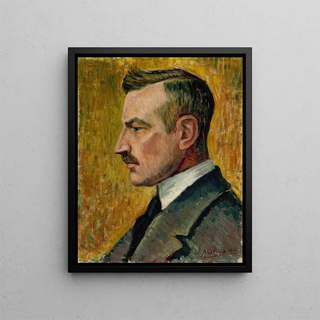Painting Portrait of the artist Magnus Enckell - Alfred William Finch | Art print


View from behind

Frame (optional)
In the fascinating world of art, some works transcend their era to become silent witnesses to human history. The art print Portrait of the artist Magnus Enckell - Alfred William Finch is one of those pieces that capture the essence of a moment, a personality, and an artistic movement. This painting, which depicts the Finnish artist Magnus Enckell, is not merely a simple representation but a true dialogue between the artist and his observer. Enckell, an emblematic figure of modernism, is here portrayed in a posture that reflects his introspection and quest for authenticity, offering the viewer a window into his creative soul.
Style and uniqueness of the work
Alfred William Finch's style stands out for his ability to blend tradition and modernity. In his depiction of Enckell, he uses vibrant colors and fluid shapes that evoke both psychological depth and lightness of being. The chosen palette, oscillating between warm and cool tones, creates an atmosphere that is both intimate and dynamic. Finch manages to capture not only the physical features of his model but also an almost ethereal essence, suggesting a spiritual connection between the artist and his work. This portrait, far from being a mere image, becomes an exploration of the emotions and thoughts that inhabit the artist, an invitation to delve into his creative universe.
The artist and his influence
Alfred William Finch, a British painter of the early 20th century, established himself as an essential figure of his time. Influenced by the artistic currents surrounding him, he developed a unique style that allowed him to stand out. His friendship with artists such as Magnus Enckell was instrumental in his career, as it enabled him to immerse himself in the vibrant modernism. Finch, through his innovative approach, contributed to redefining the codes of artistic representation, making his portraits works charged with meaning and emotion. The impact of his work is still felt today, inspiring new generations of artists seeking authenticity and depth in their practice.

Matte finish

View from behind

Frame (optional)
In the fascinating world of art, some works transcend their era to become silent witnesses to human history. The art print Portrait of the artist Magnus Enckell - Alfred William Finch is one of those pieces that capture the essence of a moment, a personality, and an artistic movement. This painting, which depicts the Finnish artist Magnus Enckell, is not merely a simple representation but a true dialogue between the artist and his observer. Enckell, an emblematic figure of modernism, is here portrayed in a posture that reflects his introspection and quest for authenticity, offering the viewer a window into his creative soul.
Style and uniqueness of the work
Alfred William Finch's style stands out for his ability to blend tradition and modernity. In his depiction of Enckell, he uses vibrant colors and fluid shapes that evoke both psychological depth and lightness of being. The chosen palette, oscillating between warm and cool tones, creates an atmosphere that is both intimate and dynamic. Finch manages to capture not only the physical features of his model but also an almost ethereal essence, suggesting a spiritual connection between the artist and his work. This portrait, far from being a mere image, becomes an exploration of the emotions and thoughts that inhabit the artist, an invitation to delve into his creative universe.
The artist and his influence
Alfred William Finch, a British painter of the early 20th century, established himself as an essential figure of his time. Influenced by the artistic currents surrounding him, he developed a unique style that allowed him to stand out. His friendship with artists such as Magnus Enckell was instrumental in his career, as it enabled him to immerse himself in the vibrant modernism. Finch, through his innovative approach, contributed to redefining the codes of artistic representation, making his portraits works charged with meaning and emotion. The impact of his work is still felt today, inspiring new generations of artists seeking authenticity and depth in their practice.






